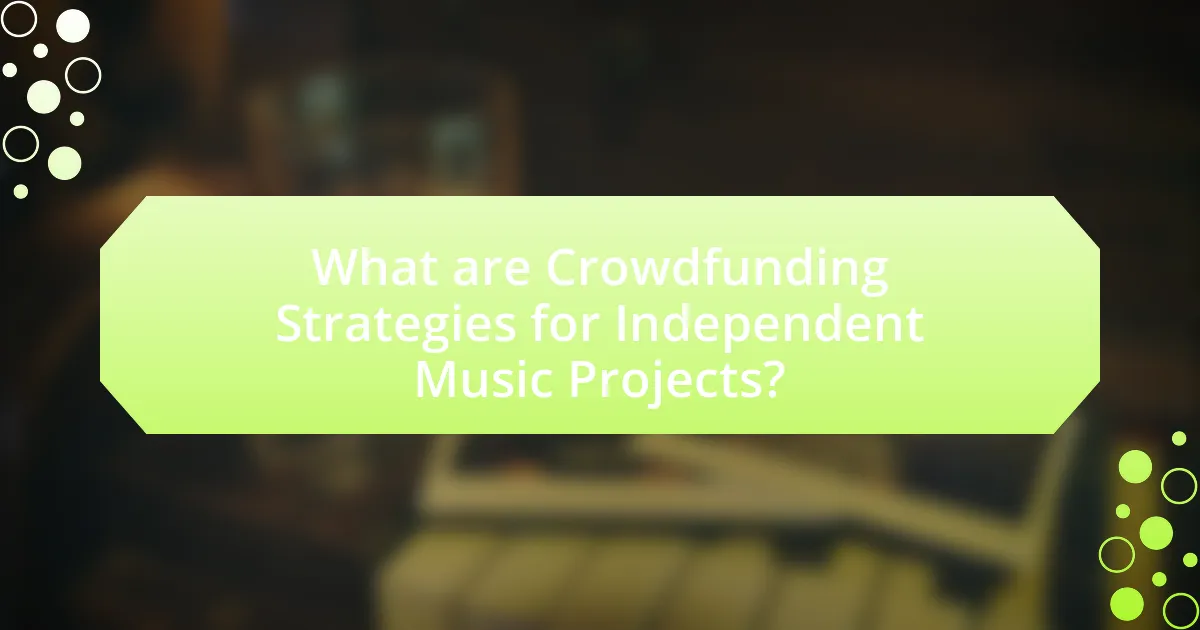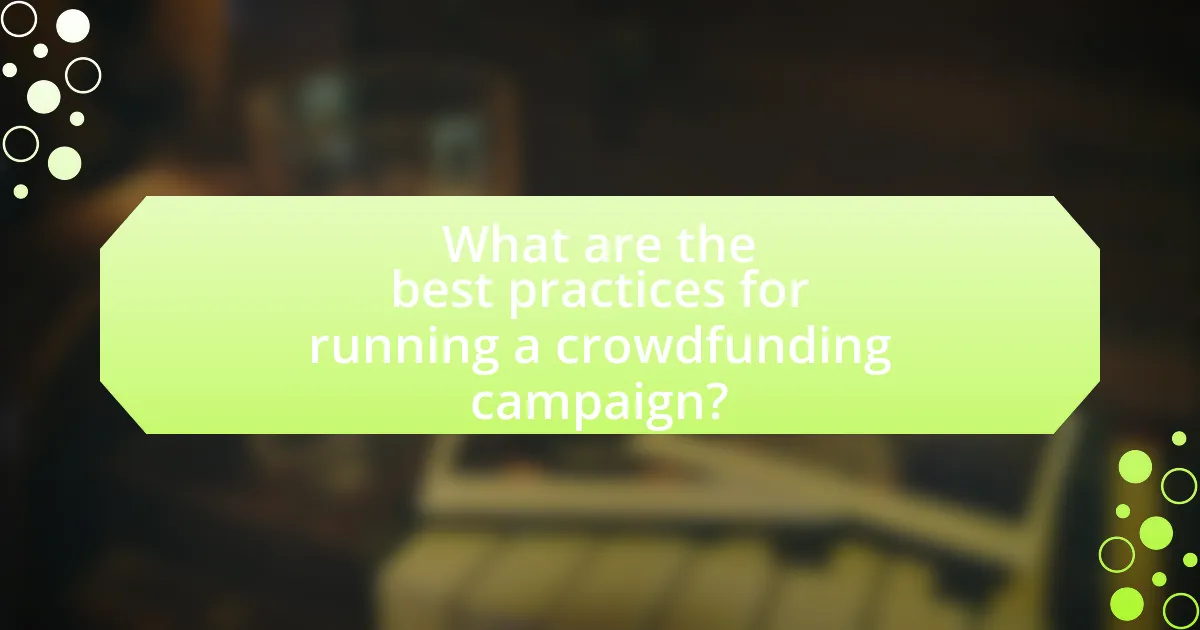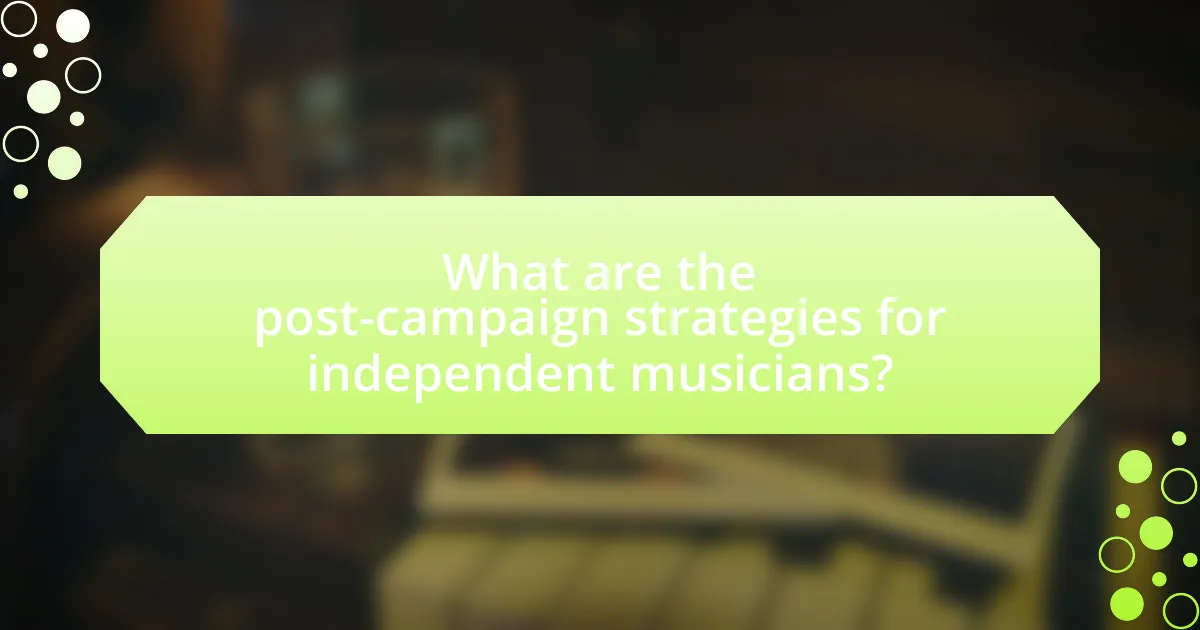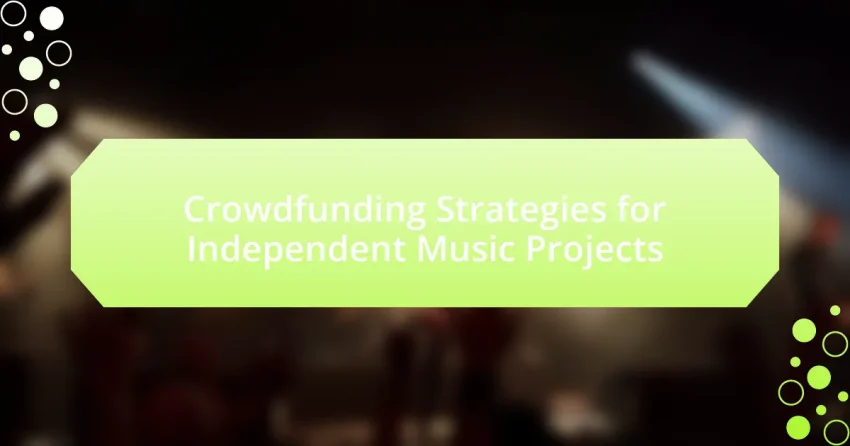Crowdfunding strategies for independent music projects are essential for independent musicians seeking financial support without traditional industry backing. Key strategies include leveraging social media for outreach, offering tiered rewards to incentivize contributions, and actively engaging with the community to foster loyalty. The article explores the benefits of crowdfunding, the challenges faced by independent musicians, and the various platforms available, such as Kickstarter and Patreon. It also outlines best practices for creating successful campaigns, maintaining momentum, and fulfilling promises to backers, while providing practical tips for maximizing crowdfunding efforts and building a loyal fanbase.

What are Crowdfunding Strategies for Independent Music Projects?
Crowdfunding strategies for independent music projects include leveraging social media, offering tiered rewards, and engaging with the community. Social media platforms like Instagram and Facebook allow artists to reach a broad audience, promoting their campaigns effectively. Offering tiered rewards incentivizes backers by providing various levels of engagement, such as exclusive content or merchandise, which can increase funding. Engaging with the community fosters a sense of belonging and encourages supporters to share the project, amplifying its reach. According to a study by the University of Pennsylvania, campaigns that actively engage their audience can raise up to 50% more funds than those that do not.
How do crowdfunding strategies benefit independent musicians?
Crowdfunding strategies benefit independent musicians by providing them with a direct source of funding to support their projects without relying on traditional music industry gatekeepers. These strategies enable musicians to engage their fanbase, allowing them to raise capital for recording, marketing, and touring through platforms like Kickstarter and Indiegogo. For instance, a study by the University of Southern California found that musicians who utilized crowdfunding raised an average of $10,000, demonstrating the financial viability of this approach. Additionally, crowdfunding fosters community building, as fans feel invested in the success of the projects they support, leading to increased loyalty and future sales.
What specific challenges do independent musicians face in funding their projects?
Independent musicians face significant challenges in funding their projects, primarily due to limited access to traditional funding sources. Many independent artists lack the financial backing that major labels provide, making it difficult to cover production costs, marketing, and distribution. According to a 2020 survey by the Music Industry Research Association, 70% of independent musicians reported that securing funds for recording and promoting their music was a major obstacle. Additionally, the competitive nature of crowdfunding platforms often leads to low success rates, with only about 30% of campaigns reaching their funding goals, as noted in a study by the University of Southern California. This combination of financial constraints and competitive crowdfunding environments creates substantial hurdles for independent musicians seeking to finance their projects.
How can crowdfunding address these challenges effectively?
Crowdfunding can effectively address challenges faced by independent music projects by providing direct access to financial resources and fostering community support. This funding model allows artists to raise capital without relying on traditional music industry gatekeepers, enabling them to maintain creative control. For instance, a study by the University of Southern California found that successful crowdfunding campaigns in the music sector often exceed their funding goals by engaging a dedicated fan base, which not only contributes financially but also promotes the project through their networks. This dual benefit of funding and community engagement helps independent musicians overcome financial barriers and build a loyal audience.
What types of crowdfunding platforms are available for music projects?
There are several types of crowdfunding platforms available for music projects, including reward-based, equity-based, and donation-based platforms. Reward-based platforms, such as Kickstarter and Indiegogo, allow artists to offer incentives like exclusive merchandise or experiences in exchange for financial support. Equity-based platforms, like SeedInvest, enable backers to invest in a music project in exchange for a share of future profits. Donation-based platforms, such as GoFundMe, focus on raising funds without offering any financial return, relying instead on the goodwill of supporters. Each type serves different needs and goals for independent musicians seeking funding.
What are the differences between reward-based and equity-based crowdfunding?
Reward-based crowdfunding involves contributors receiving non-financial rewards, such as products or experiences, in exchange for their financial support, while equity-based crowdfunding allows investors to receive shares or ownership stakes in the company. In reward-based crowdfunding, platforms like Kickstarter facilitate projects where backers pledge money to receive tangible items or services, with the total amount raised often determining the level of reward. Conversely, equity-based crowdfunding, often conducted through platforms like SeedInvest, enables individuals to invest in startups and receive equity, thus participating in the company’s potential financial success. The key difference lies in the nature of the return: reward-based crowdfunding focuses on tangible rewards, while equity-based crowdfunding emphasizes ownership and profit-sharing.
Which platforms are most popular among independent musicians?
The most popular platforms among independent musicians are Bandcamp, SoundCloud, and Patreon. Bandcamp allows artists to sell their music directly to fans while retaining a significant portion of the revenue, making it a preferred choice for many. SoundCloud provides a platform for sharing music and connecting with listeners, offering tools for promotion and audience engagement. Patreon enables musicians to create subscription-based revenue streams by offering exclusive content to their supporters. These platforms are widely recognized for their effectiveness in helping independent musicians reach audiences and generate income.
How can independent musicians create a successful crowdfunding campaign?
Independent musicians can create a successful crowdfunding campaign by clearly defining their project goals, engaging their audience, and offering compelling rewards. Setting specific financial targets and timelines helps potential backers understand the project’s scope and urgency. Engaging the audience through social media and email updates fosters a sense of community and investment in the project. Offering tiered rewards, such as exclusive content or merchandise, incentivizes contributions and enhances backer satisfaction. According to a study by the University of Southern California, campaigns that effectively communicate their vision and maintain regular updates are 50% more likely to reach their funding goals.
What are the key elements of a compelling crowdfunding pitch?
A compelling crowdfunding pitch includes a clear project description, a relatable personal story, a well-defined target audience, engaging visuals, and specific funding goals. The project description should succinctly explain what the project is about and its significance, while the personal story connects emotionally with potential backers, making them feel invested. Identifying a target audience helps tailor the message effectively, ensuring it resonates with those most likely to support the project. Engaging visuals, such as videos or images, enhance the pitch’s appeal and help convey the project’s essence. Lastly, setting specific funding goals provides clarity and urgency, motivating backers to contribute. These elements are essential as they collectively enhance the pitch’s effectiveness, increasing the likelihood of successful funding.
How important is marketing in a crowdfunding campaign?
Marketing is crucial in a crowdfunding campaign as it directly influences the project’s visibility and funding success. Effective marketing strategies can increase awareness, attract backers, and create a sense of urgency, which are essential for reaching funding goals. Research indicates that campaigns with a strong marketing presence can raise up to 50% more funds than those without. For instance, a study by the University of Pennsylvania found that campaigns that utilized social media effectively had a 20% higher success rate. Thus, marketing is not just important; it is a fundamental component that can significantly impact the outcome of crowdfunding efforts.

What are the best practices for running a crowdfunding campaign?
The best practices for running a crowdfunding campaign include setting a clear funding goal, creating an engaging campaign page, and promoting the campaign effectively. A clear funding goal helps potential backers understand the financial needs of the project, while an engaging campaign page with compelling visuals and storytelling captures attention and encourages contributions. Effective promotion through social media, email marketing, and outreach to relevant communities increases visibility and attracts more backers. According to a study by Indiegogo, campaigns that update backers regularly and maintain communication are 50% more likely to succeed, highlighting the importance of ongoing engagement throughout the campaign.
How can musicians effectively engage their audience during the campaign?
Musicians can effectively engage their audience during a crowdfunding campaign by utilizing interactive content and personalized communication. Engaging audiences through live streaming events, Q&A sessions, and behind-the-scenes content fosters a sense of community and connection. Research indicates that campaigns with regular updates and direct interaction see a 50% higher engagement rate, as audiences feel more invested in the project. Additionally, personalized messages and rewards tailored to backers’ preferences can enhance their emotional investment, leading to increased support and sharing of the campaign.
What role does social media play in promoting a crowdfunding campaign?
Social media plays a crucial role in promoting a crowdfunding campaign by providing a platform for reaching a wide audience and facilitating engagement. It allows campaign creators to share updates, connect with potential backers, and build a community around their project. According to a study by the University of Pennsylvania, campaigns that actively utilize social media can raise up to 50% more funds than those that do not, highlighting the effectiveness of these platforms in driving financial support.
How can musicians maintain momentum throughout the campaign duration?
Musicians can maintain momentum throughout the campaign duration by consistently engaging their audience through regular updates and interactive content. Regular updates keep backers informed about progress and foster a sense of community, while interactive content, such as live Q&A sessions or behind-the-scenes videos, encourages participation and investment in the project. Research indicates that campaigns with frequent updates are 50% more likely to reach their funding goals, highlighting the importance of sustained communication.
What common pitfalls should musicians avoid in crowdfunding?
Musicians should avoid several common pitfalls in crowdfunding, including setting unrealistic funding goals. Many campaigns fail because musicians overestimate their audience size and the amount they can raise, leading to disappointment and lack of trust. Additionally, neglecting to engage with backers can result in a lack of support; consistent communication is crucial for maintaining interest and momentum. Failing to offer compelling rewards can also deter potential backers; rewards should be attractive and relevant to the audience. Lastly, not promoting the campaign effectively can lead to insufficient visibility; musicians should utilize social media and other platforms to reach a broader audience. These pitfalls are supported by data indicating that campaigns with clear goals, strong engagement, appealing rewards, and effective promotion are significantly more likely to succeed.
What mistakes can lead to a failed crowdfunding campaign?
Mistakes that can lead to a failed crowdfunding campaign include inadequate planning, lack of a clear value proposition, insufficient marketing efforts, and failure to engage with backers. Inadequate planning often results in unrealistic funding goals or timelines, which can deter potential supporters. A lack of a clear value proposition fails to communicate the project’s unique benefits, making it difficult for backers to see why they should contribute. Insufficient marketing efforts can lead to low visibility, as campaigns that do not effectively promote themselves struggle to reach their target audience. Lastly, failure to engage with backers can create a disconnect, leading to a lack of trust and support, which is crucial for campaign success. According to a study by Indiegogo, campaigns that actively engage with their audience are 50% more likely to reach their funding goals.
How can musicians prepare for potential setbacks during the campaign?
Musicians can prepare for potential setbacks during a crowdfunding campaign by developing a comprehensive risk management plan. This plan should identify possible challenges such as funding shortfalls, negative feedback, or logistical issues, and outline specific strategies to address each scenario. For instance, musicians can set a funding goal that includes a buffer to accommodate unexpected expenses, ensuring they have a financial cushion. Additionally, they can engage with their audience early and often to build a supportive community, which can help mitigate negative feedback and foster loyalty. Research indicates that campaigns with proactive communication strategies tend to perform better, as they maintain backer trust and engagement throughout the process.

What are the post-campaign strategies for independent musicians?
Post-campaign strategies for independent musicians include engaging with backers, leveraging social media for continued promotion, and analyzing campaign performance. Engaging with backers through personalized thank-you messages and updates fosters community and encourages future support. Utilizing social media platforms to share behind-the-scenes content, upcoming shows, or new releases keeps the momentum going and maintains audience interest. Analyzing campaign performance through metrics such as funding sources and backer demographics helps musicians refine future strategies and improve outreach efforts. These strategies are essential for sustaining growth and building a loyal fanbase after a crowdfunding campaign.
How can musicians effectively fulfill their promises to backers?
Musicians can effectively fulfill their promises to backers by maintaining clear communication, delivering rewards on time, and providing updates throughout the project. Clear communication ensures that backers are informed about the project’s progress and any potential delays, fostering trust. Timely delivery of rewards, such as exclusive content or merchandise, aligns with backers’ expectations and reinforces their support. Regular updates, including behind-the-scenes insights or milestone achievements, keep backers engaged and invested in the project’s success. Research indicates that projects with consistent communication and timely fulfillment have higher backer satisfaction rates, which can lead to increased support for future endeavors.
What are the best practices for delivering rewards to supporters?
The best practices for delivering rewards to supporters include timely fulfillment, clear communication, and personalization. Timely fulfillment ensures that supporters receive their rewards as promised, which builds trust and encourages future support. Clear communication involves keeping supporters informed about the status of their rewards, including any delays or changes, which enhances transparency and satisfaction. Personalization of rewards, such as including a handwritten note or customizing items, makes supporters feel valued and appreciated, fostering a stronger connection to the project. These practices are supported by research indicating that timely and personalized rewards significantly increase supporter retention and satisfaction in crowdfunding campaigns.
How can musicians leverage their crowdfunding success for future projects?
Musicians can leverage their crowdfunding success for future projects by using the funds and community support gained to enhance their visibility and credibility. Successful crowdfunding campaigns often lead to a loyal fanbase, which musicians can engage for future projects through exclusive content, early access to new releases, or special events. Additionally, musicians can showcase their previous crowdfunding achievements in future campaigns to build trust and attract more backers. For instance, a study by the University of Southern California found that artists who successfully funded previous projects were 30% more likely to reach their funding goals in subsequent campaigns, demonstrating the importance of established credibility.
What practical tips can help musicians maximize their crowdfunding efforts?
Musicians can maximize their crowdfunding efforts by creating a compelling campaign that clearly communicates their project goals and engages potential backers. A well-defined narrative about the music project, including personal stories and the impact of the funding, can significantly enhance emotional connection and support. Additionally, offering attractive rewards that resonate with supporters, such as exclusive content or experiences, can incentivize contributions.
Research indicates that campaigns with a clear video presentation raise 50% more funds than those without, highlighting the importance of visual storytelling. Furthermore, promoting the campaign across multiple social media platforms and leveraging existing fan networks can increase visibility and reach. Engaging with backers through updates and personalized messages fosters community and encourages ongoing support.
According to a study by the University of Pennsylvania, campaigns that maintain regular communication with backers are 20% more likely to reach their funding goals. By implementing these strategies, musicians can effectively enhance their crowdfunding success.
How can musicians build a loyal fanbase before launching a campaign?
Musicians can build a loyal fanbase before launching a campaign by actively engaging with their audience through social media, live performances, and exclusive content. Engaging with fans on platforms like Instagram and Twitter allows musicians to create a personal connection, fostering loyalty. For instance, artists who regularly share behind-the-scenes content or interact with fans through Q&A sessions often see increased support. Research indicates that musicians who maintain consistent communication with their audience can increase fan retention rates by up to 30%. Additionally, offering exclusive pre-release access to music or merchandise can incentivize fans to become more invested in the artist’s journey, further solidifying their loyalty.
What resources are available for musicians seeking crowdfunding guidance?
Musicians seeking crowdfunding guidance can access various resources, including platforms like Kickstarter and Indiegogo, which provide detailed guidelines and success stories. Additionally, websites such as Patreon offer insights into subscription-based funding models tailored for artists. Educational resources like the “Crowdfunding for Musicians” course on platforms like Udemy and articles from Music Business Worldwide provide practical tips and strategies. Furthermore, community forums and social media groups dedicated to musicians often share experiences and advice on effective crowdfunding practices.
